20 Best Mobile App Testing Tools in 2024

Technology is continuously evolving so do users’ expectations. In such cases, The challenge for organizations is to offer faultless, intuitive, and dependable experiences. That makes mobile app testing an essential element of the development process to meet these needs. Testing ensures that apps work seamlessly across several devices, operating systems, and user scenarios, ensuring user pleasure and the app’s reputation.

Source
According to a survey, smartphone penetration and the usage of mobile applications are growing steadily. In 2022, there were almost 6.4 billion smartphone users. By 2028, this number is expected to reach around 7.7 billion. This booming digital transformation is one of the major reasons companies invest more in the best mobile app testing tools.
However, with the rapid growth of the mobile app market and the wide variety of platforms and devices accessible, manual testing is no longer suitable. Developers and testers increasingly rely on a diverse set of mobile app testing tools to expedite and improve their testing efforts. These tools include advanced functionality and automation capabilities that speed up the testing process, improve productivity, and aid in the early detection of faults and errors. This blog will provide a list of the best mobile app testing tools and their pros and cons, which can help you to elevate the quality and performance of mobile applications.
TABLE OF CONTENTS
- What is Mobile App Automation?
- Why is Mobile App Testing Important?
- Best Mobile App Testing Tools
- What to Look for in Your Mobile App Testing Tool?
- Frequently Asked Questions
What is Mobile App Automation?
Mobile App Automation involves automating various aspects of mobile app development and operations, including testing, deployment, monitoring, and optimization. It enables developers to efficiently handle repetitive tasks, reduce errors, and accelerate the time-to-market of mobile applications.
Why is Mobile App Testing Important?
One common element in successfully developing any mobile application is adopting the best mobile app testing strategy. This testing strategy revolves around the various mobile QA tools that are more reliable and cost-effective.
Here are some of the advantages of using a mobile app testing tool:
- Automated and cross-platform testing
- Long-term cost reduction
- Easy to share test results
- Saves time – Faster and more reliable execution
- Perform quality assurance tests
Since every tool has its own set of advantages and challenges. Here are some of the key challenges of mobile app testing one can face:
- Selecting the right mobile app testing tool
- Selection of devices
- Device fragmentation and various OS platforms
- Different mobile user interfaces
In addition to the features mentioned above, here are some of the other factors you can consider before choosing your mobile application testing tool:
- Browser, network, and device compatibility
- Bandwidth and security
- User expectations
- Multiple software upgrades
There are several mobile app testing tools that you can choose to implement your testing practices. These mobile app testing tools help you automate the testing of your Android and iOS applications and reduce the time required for the testing process.
Best Mobile App Testing Tools
Having the correct mobile app testing tools in your arsenal is critical for assuring the quality and performance of your Android and iOS mobile apps. These tools are great assets for properly managing and implementing mobile app testing strategies. They are proven to streamline your operations and produce results, whether you’re a developer, tester, or an individual trying to improve your mobile app testing efforts. Here is the list of the best mobile app testing tools for mobile app testing.
1. LambdaTest

In our list of best mobile app testing tools, LambdaTest grabs the first place. It is an AI-powered test orchestration and execution platform that enables you to test mobile apps on simulators & emulators, and real devices. You can run tests across multiple devices using LambdaTest online real device cloud.
LambdaTest also lets you perform manual app testing and app test automation of your native apps on a wide range of 3000+ Android and iOS devices. This helps to replace your expensive testing strategies with an easy-to-implement cloud mobile testing platform that is more reliable and compatible with testing on real devices.
LambdaTest offers both real devices cloud and virtual devices (Emulator and Simulator) for mobile app testing. Here are the steps for mobile app testing on LambdaTest Real Device cloud.
- Register for free on LambdaTest and log in to your account.
- From the left sidebar menu, go to Real Device > App Testing
- Select OS (Android or iOS) as per your requirement, upload your application, and select the device, and OS version of your mobile device. Once you’ve completed these steps, click the Start button to proceed.

When you click on the Start button, it will launch a cloud-based real device where you can perform mobile app testing as per real-world conditions.
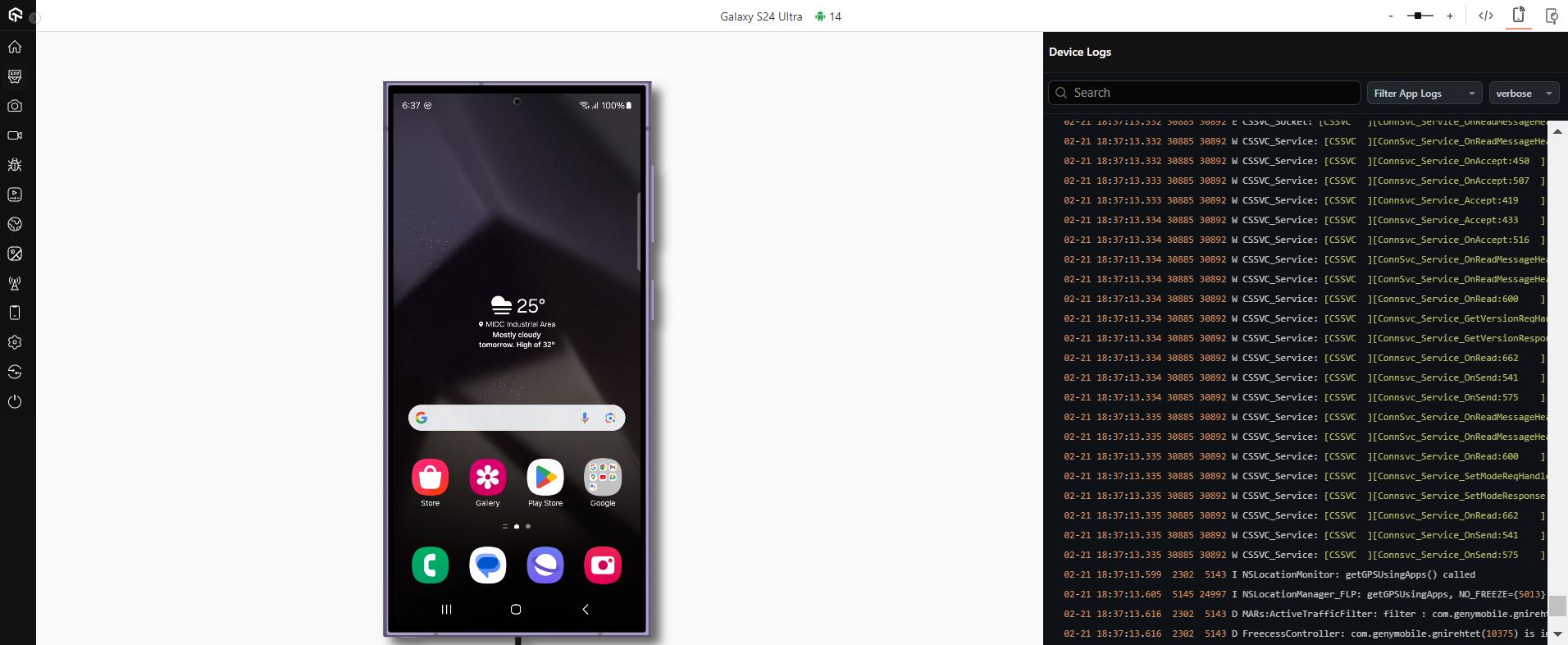
If you want to perform mobile app testing on virtual devices (Emulator and Simulator), the process is the same.
With LambdaTest, you can automate mobile app testing on a real device cloud using popular frameworks like Appium, Espresso, and XCUITest.
Refer to support documentation to start app automation with Appium.
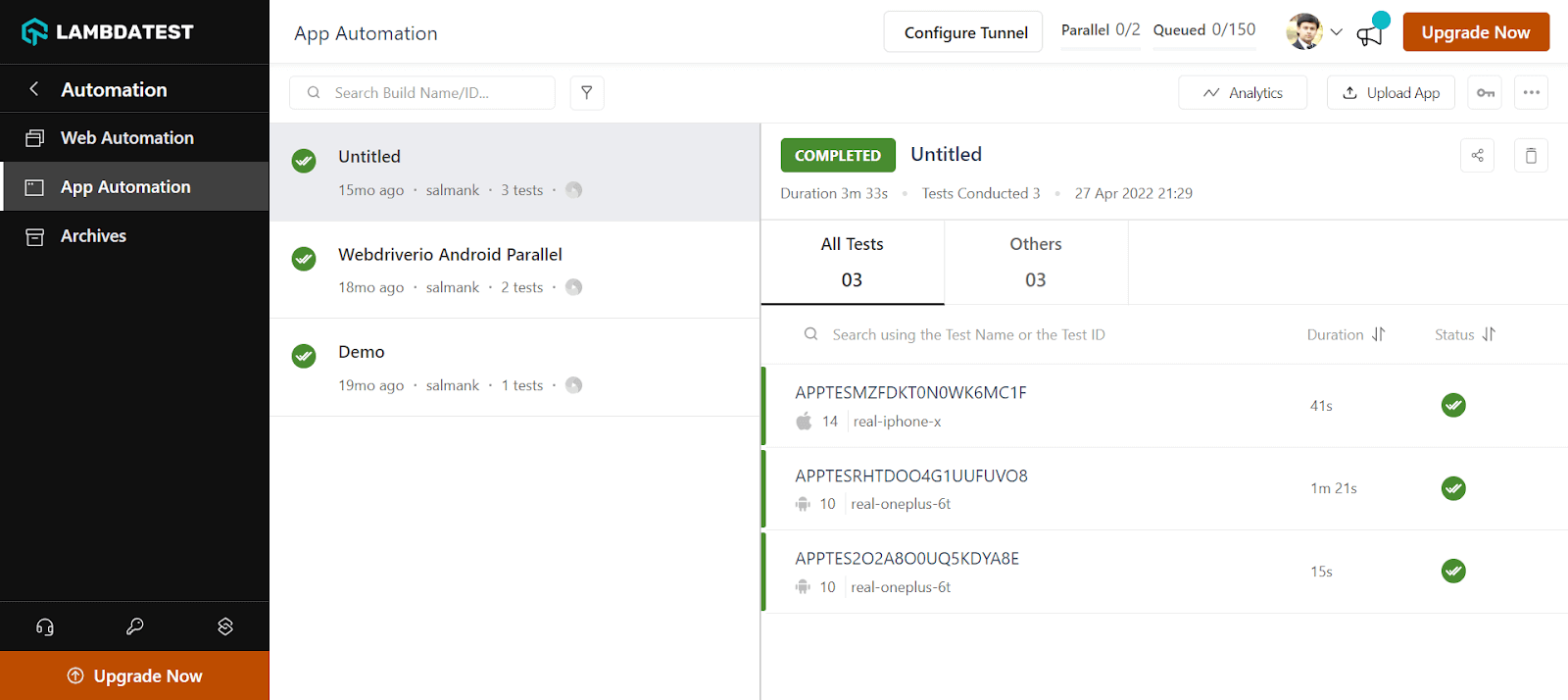
If you want to perform app automation on a real device, you should check out our video tutorial, where you can learn in detail from experts about mobile app testing.
Subscribe to the LambdaTest YouTube Channel to stay updated on the latest tutorials about Selenium testing, Appium automation, and more.
2. Appium
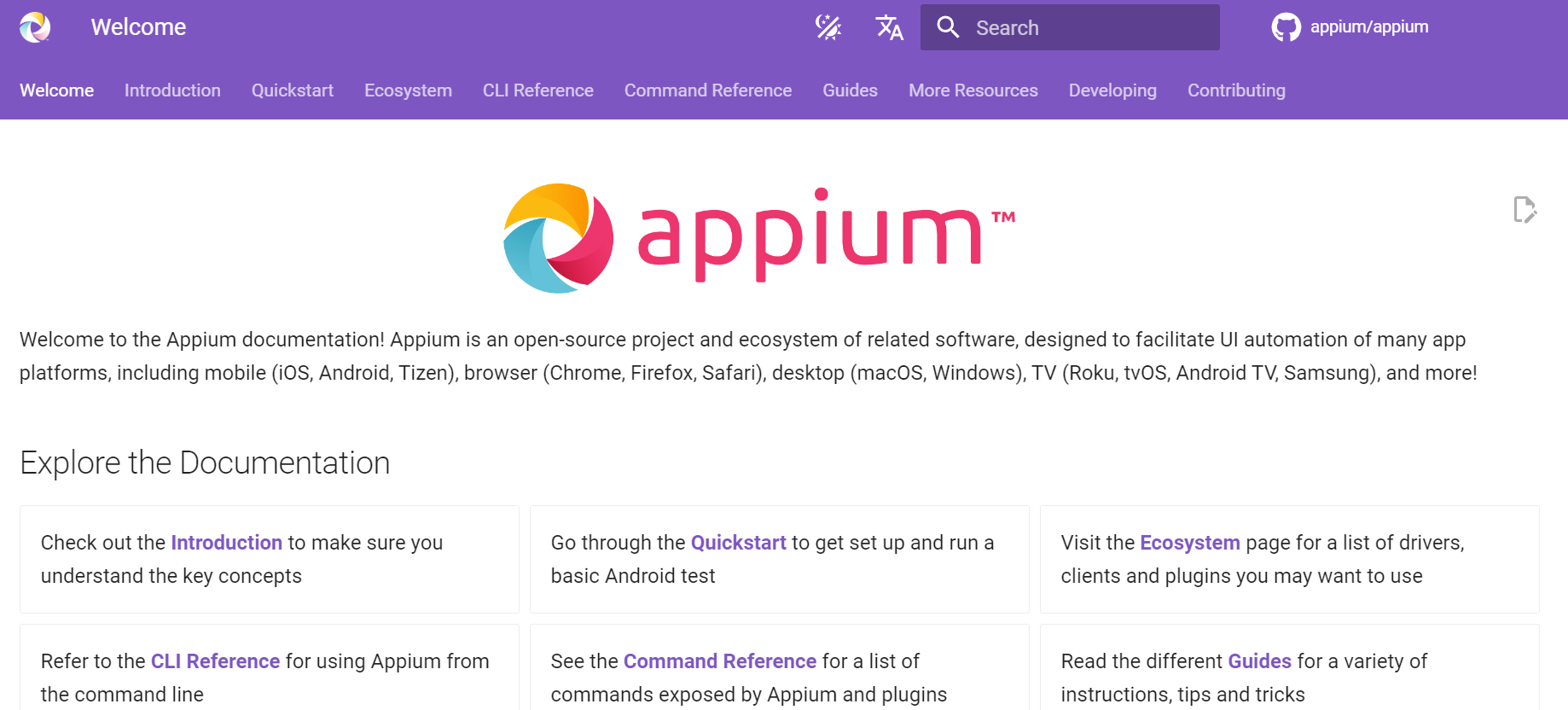
Appium is an open-source automation testing tool that can be used for both Android and iOS apps. It is an effective tool for web and mobile application testing and works even for hybrid apps. Appium is also used for automated functional testing that improves the overall functionality of the applications. To know more, refer to the blog on the difference between Web vs. Hybrid vs. Native apps.
Pros of using Appium mobile app testing tool
- Multiple language support – End-to-end testing in multiple programming languages such as Java, JavaScript, Node, Python, Ruby, and C#.
- Supports testing on iOS and Android devices using the same API.
- Record and playback feature allows testers to speed up the testing process and produce test scripts in multiple programming languages.
- Integrates easily with Jenkins and other popular CI/CD tools. Those advantages make Appium one of the best mobile app testing tools.
Cons of using Appium mobile app testing tool
- Complex setup: Appium’s client-server model requires advanced programming skills to configure the server, making automation more complex.
- Flaky tests: Appium tests can be inconsistent, leading to different results for the same configuration and disrupting workflow.
- Slower speed: Appium’s architecture causes slow server startup and delays in executing actions, affecting test cycles.
- Problems with locating elements: Appium struggles to automatically locate elements and recognize images, requiring manual input of element positions.
- Limited support for older Android versions: Appium does not support Android versions older than 4.2, reducing test coverage, but this can be mitigated by using other frameworks like Selendroid.
Here is a quick video tutorial on mobile app automation using the Appium framework.

Note
Refer to our support doc to get started with app automation with Appium.
3. Robotium
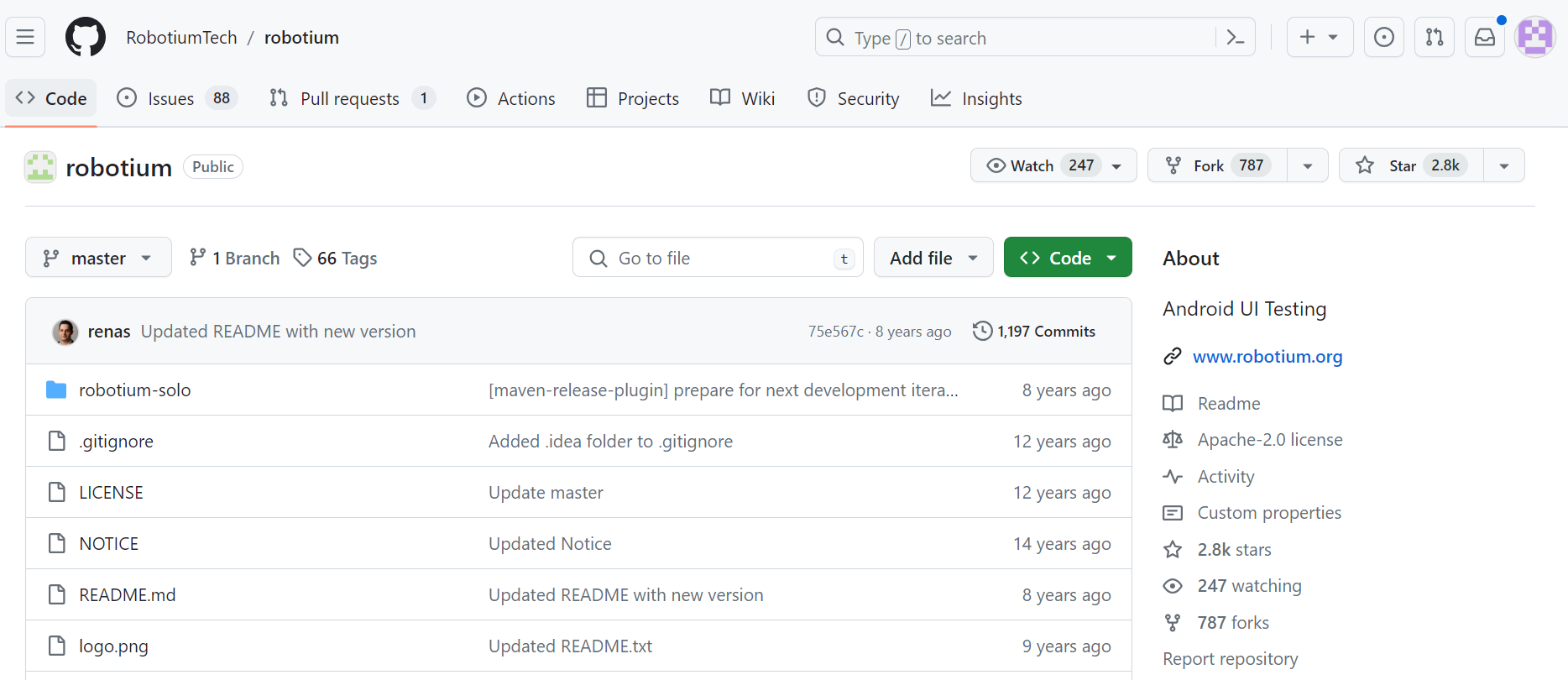
Robotium is an open-source and one of the best mobile app testing tools, which means it’s a set of tools and guidelines that developers can use for testing their apps. It’s designed to automate the testing process so developers don’t have to manually check every aspect of their app.
With Robotium, developers can write test cases for different testing scenarios. These scenarios can include checking if specific functions in the app are working as expected, testing how the app behaves in different situations, or even testing if the app meets certain acceptance criteria.
One cool thing about Robotium is that it can handle multiple activities in an Android app. Activities are like different screens or sections of an app. So, if an app has multiple screens, Robotium can still test it effectively.
Pros of using Robotium mobile app testing tool
- Simple and effective test case creation is made possible by Robotium, which results in shorter code and less time spent writing effective test cases.
- With Robotium, developers may write effective test cases even with a minimal application understanding.
- Multiple Android activities are automatically handled by the framework, which makes test cases easier to read than those produced by traditional instrumentation tests.
- Robotium automates timing and delay management during test execution, removing the need for manual intervention. Make it one of the most innovative mobile app testing tools.
- Robotium connects with Maven or Ant without any issues. The framework is very effective and reliable for testing mobile apps because it doesn’t call for any changes to the Android platform.
Cons of using Robotium mobile app testing tool
- When testing mobile apps, Robotium cannot handle Flash or Web components.
- It is capable of managing just one application at once.
- Developers must utilize the ‘enterText()’ function to enter text into an EditText field because Robotium cannot imitate clicking on the soft keyboard.
- Robotium does not support interacting with Status Bar Notifications, such as removing the Notification area and clicking on a particular Notification.
- Performance can be a little sluggish on older devices.
4. Selendroid
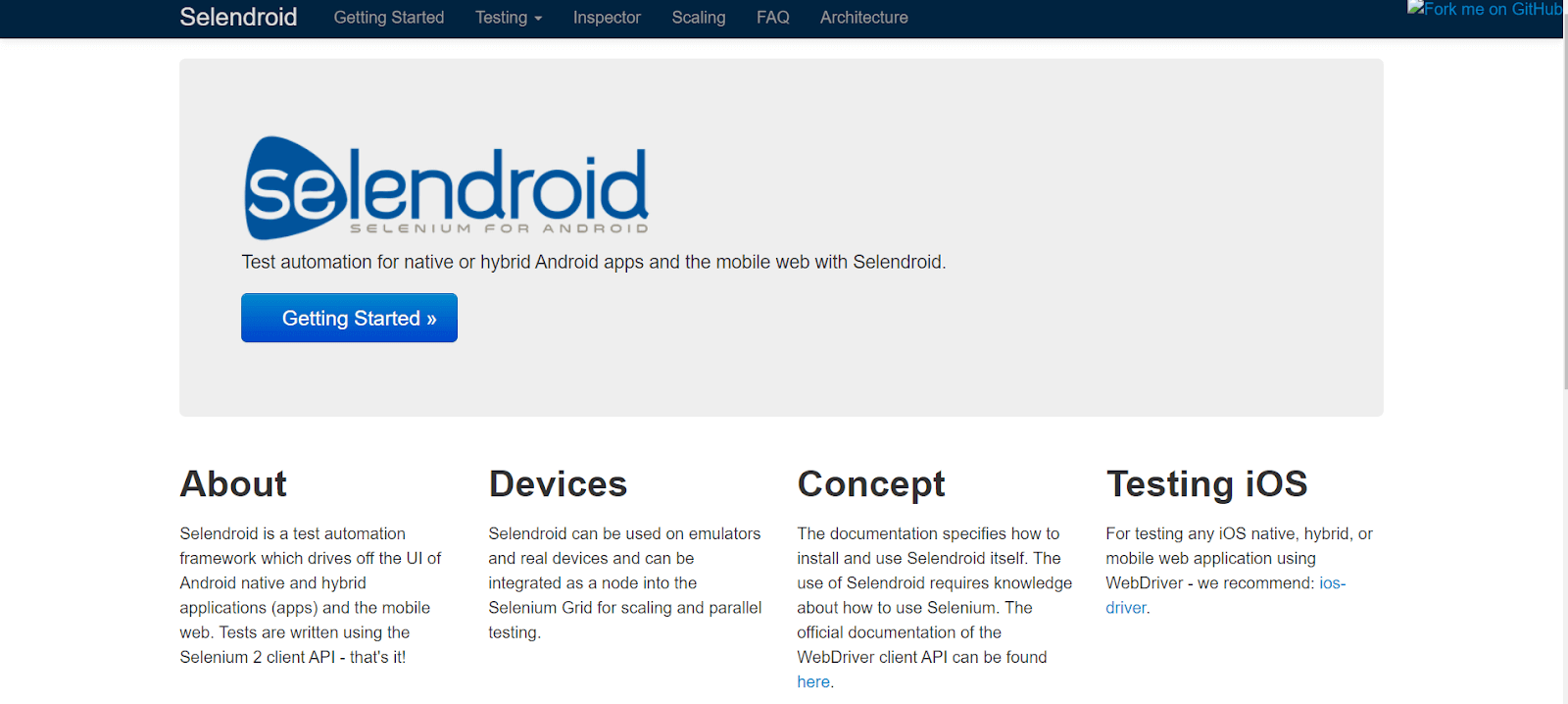
Selendroid is an open-source automation framework designed to operate through the user interface (UI) of Android native, hybrid, and mobile web applications. It leverages the underlying Android instrumentation framework to achieve this functionality. In addition, the tests are scripted utilizing the API of the Selenium 2 client, also known as the Selenium WebDriver; that integration allows Selendroid to utilize and build upon the existing Selenium framework effectively.
Pros of using Selendroid mobile app testing tool
- Selendroid seamlessly integrates with the JSON wire protocol and is fully compatible with Selenium 3, making it a reliable choice for automation.
- With Selendroid, there’s no need to modify the app you want to test, simplifying the automatic test procedure for mobile testing.
- It is one of the tester’s favorite mobile app testing tools because the built-in web view app Android driver in Selendroid allows for efficient testing of mobile web applications.
- Whether it’s a native or hybrid app, Selendroid applies the same concept to automate the testing process, ensuring consistency and ease of use.
- Locating any UI element becomes effortless with Selendroid, thanks to its support for various locators.
Cons of using Selendroid mobile app testing tool
- Selendroid may exhibit reduced testing speeds, potentially leading to longer test execution times.
- To effectively utilize Selendroid, it is advisable to have access to high-end machines or devices with ample processing power and resources.
- Selendroid may not perform optimally or even be compatible with systems with less than 4 GB of RAM, making it unsuitable for such configurations.
5. XCUITest
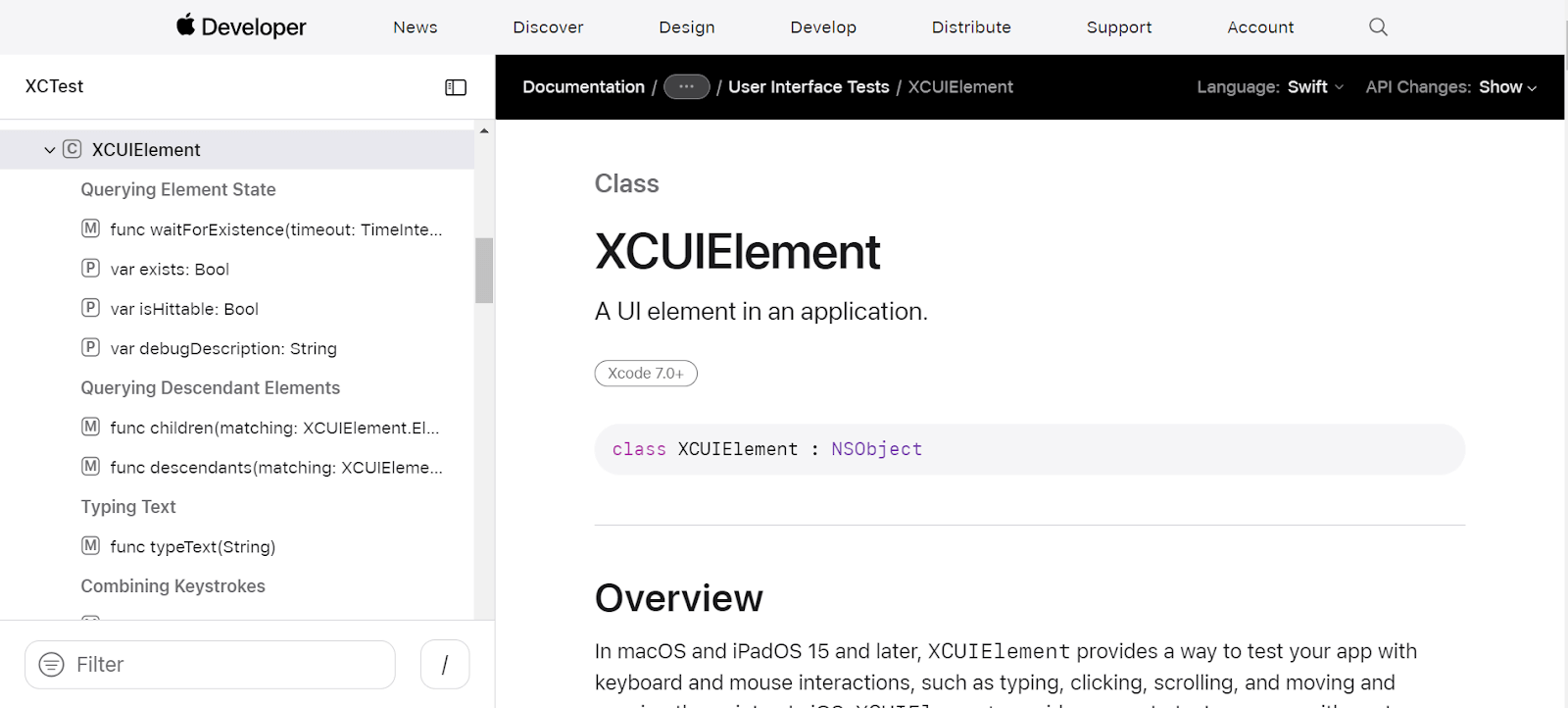
In 2015, Apple introduced XCUITest, one of the most powerful mobile app testing tools designed specifically for automating UI tests on iOS devices. Built upon XCTest, which is Apple’s integrated test framework for Xcode, XCUITest offers a seamless and efficient testing experience. With XCUITest, you can write automated UI tests using Swift or Objective-C, the two programming languages commonly used for developing native iOS and macOS applications.
Pros of using XCUITest mobile app testing tool
- XCUITest’s seamless integration within the Xcode IDE makes it intuitive for developers to use.
- XCUITest excels in executing tests against iOS devices, delivering faster results than other UI automated testing tools, thanks to its efficient framework architecture.
- The framework’s architecture ensures reliable test execution, minimizing flakiness and providing consistent results.
- Over the past year, the APIs and framework of XCUITest have significantly matured, enhancing its stability and robustness.
- XCUITest operates directly at the object level, reducing the maintenance efforts typically required for applications when changes occur, thereby streamlining the test maintenance process.
Cons of using XCUITest mobile app testing tool
- Device fragmentation: Testing across various Android devices with different screen sizes, resolutions, and hardware configurations can be time-consuming and complex.
- Testing across multiple platforms: Testing an app across Android platforms, including smartphones and tablets, requires additional testing frameworks and tools.
- App complexity: Complex applications with intricate builds, multiple screens, and extensive data make it challenging to identify and cover all edge cases.
- Test maintenance: Updating and maintaining the test suite as the app evolves with new features often requires a dedicated team or individuals and can be time-consuming.

Note
Refer to our support doc to get started with app automation with XCUITest.
6. Espresso
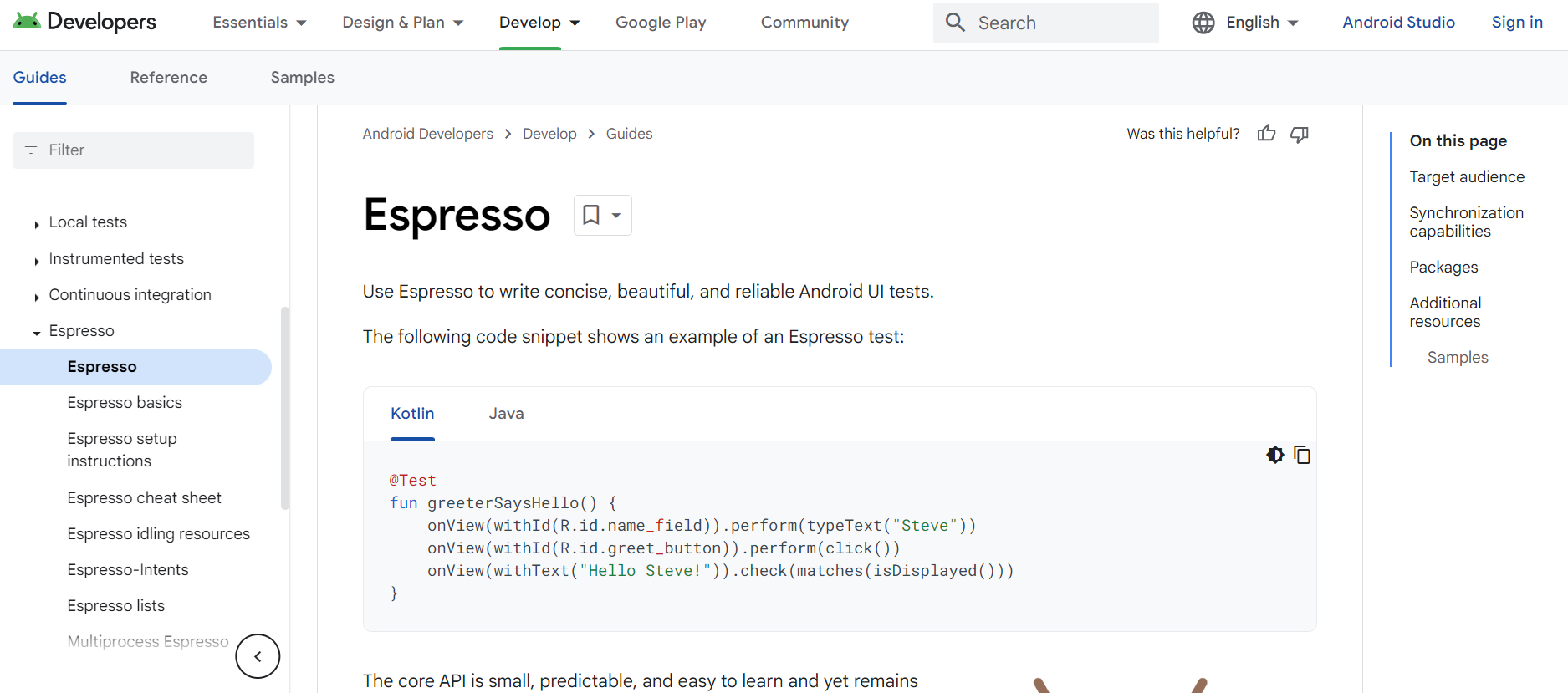
Espresso is a framework for Android automation testing developed by Google and has gained significant popularity due to its exceptional performance. With Espresso, you can effortlessly create straightforward tests without the need to be concerned about the intricacies of the application’s infrastructure. Moreover, this open-source framework allows developers to customize it according to their requirements. Such features make Espresso one of the best mobile app testing tools.
Research conducted by the University of Oulu has revealed that Espresso boasts remarkable speed, offering the shortest test execution time and fallibility among testing frameworks. This makes it a preferred choice for efficient testing.
Pros of using Espresso mobile app testing tool
- Using Espresso, you can build a standalone APK file for your test suite, allowing easy installation and quick execution on your device or APK Emulator Online.
- Espresso enables faster feedback on code changes, aiding in quicker debugging and issue resolution.
- Unlike Selenium RemoteWebDriver and other mobile app testing tools, Espresso runs alongside the application and provides instant test results, eliminating the need for a separate server.
- Espresso’s synchronized execution and element confirmation mechanism ensures stable test cycles and prevents failures due to undetected objects.
- Developing test suites for Espresso is easier, simplifying the overall app development process, and it can be set up easily in Android Studio.
Cons of using Espresso mobile app testing tool

Note
Refer to our support doc to get started with app automation with Espresso.
7. Nightwatch.js
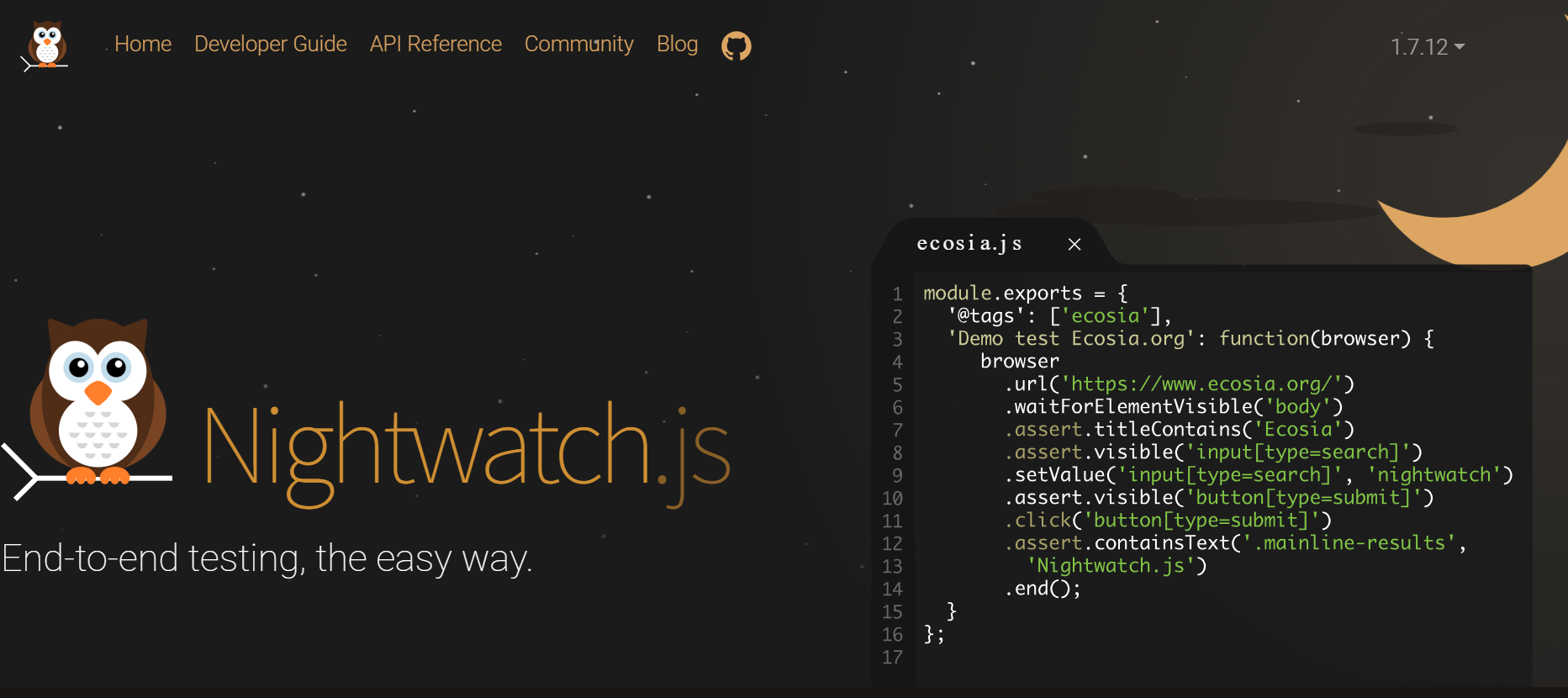
Nightwatch.js is a comprehensive testing tool that facilitates the automated end-to-end testing of web applications and websites across popular browsers. Developed in Node.js, it leverages the W3C WebDriver API to interact with different browsers seamlessly.
This framework provides a holistic approach to testing, covering end-to-end and cross-browser scenarios. Its primary objective is to streamline the creation and execution of diverse test types, such as:
- End-to-end tests: These tests encompass all major web browsers and allow for a thorough evaluation of application functionality.
- Unit tests: Nightwatch.js supports the testing of Node.js services, enabling developers to assess the individual components of their applications.
- Integration tests: With Nightwatch.js, HTTP APIs can be thoroughly examined to ensure seamless integration between different components.
Pros of using Nightwatch.js mobile app testing tool
- It possesses a powerful setup and a streamlined framework that enhances performance.
- Requires minimal code upkeep and enhances the organization of tests.
- Offers superior performance and facilitates advanced parallelism.
- Enables configuration with Cucumber to establish a BDD (Behavior Driven Development) environment.
- Supports a wide range of features, including multi-tabs, iFrames, pinch-zoom, and geolocation.
- Provides built-in support for Page Object Model, implicit waits, HTML reporter, and other useful functionalities.
Cons of using Nightwatch.js mobile app testing tool
- The available reporter options in this framework are not as extensive as those in Jest or other mobile app testing tools.
- Custom messages for expected assertions are not supported in this framework.
- Compared to headless browsers like Cypress, this framework is slower.
8. Robot Framework

Robot framework is an open-source framework designed for test automation and the development of acceptance tests. It offers various styles for writing test cases, including keyword-driven, behavior-driven, and data-driven approaches. This diversity in test case styles contributes to its exceptional ease of understanding. Test cases are composed in a tabular format using a keyword style, further enhancing readability and clarity.
Pros of using Robot mobile app testing tool
- Robot framework provides robust support for integrating external libraries and tools, allowing for seamless automation.
- The installation process is straightforward, simplifying test case creation and execution, making it accessible to newcomers without extensive testing knowledge.
- Robot framework accommodates various styles of writing test cases, including keyword-driven, behavior-driven, and data-driven approaches.
Cons of using Robot mobile app testing tool
- Unlike some popular mobile app testing tools, Robot lacks support for if-else, nested loops, making complex code challenging to handle.
- Maintaining the Robot framework can be difficult due to its complexities.
- Customizing Robot framework HTML reports can be a challenging task.
- Parallel test execution is not supported by the Robot framework.
9. Xamarin.UITest
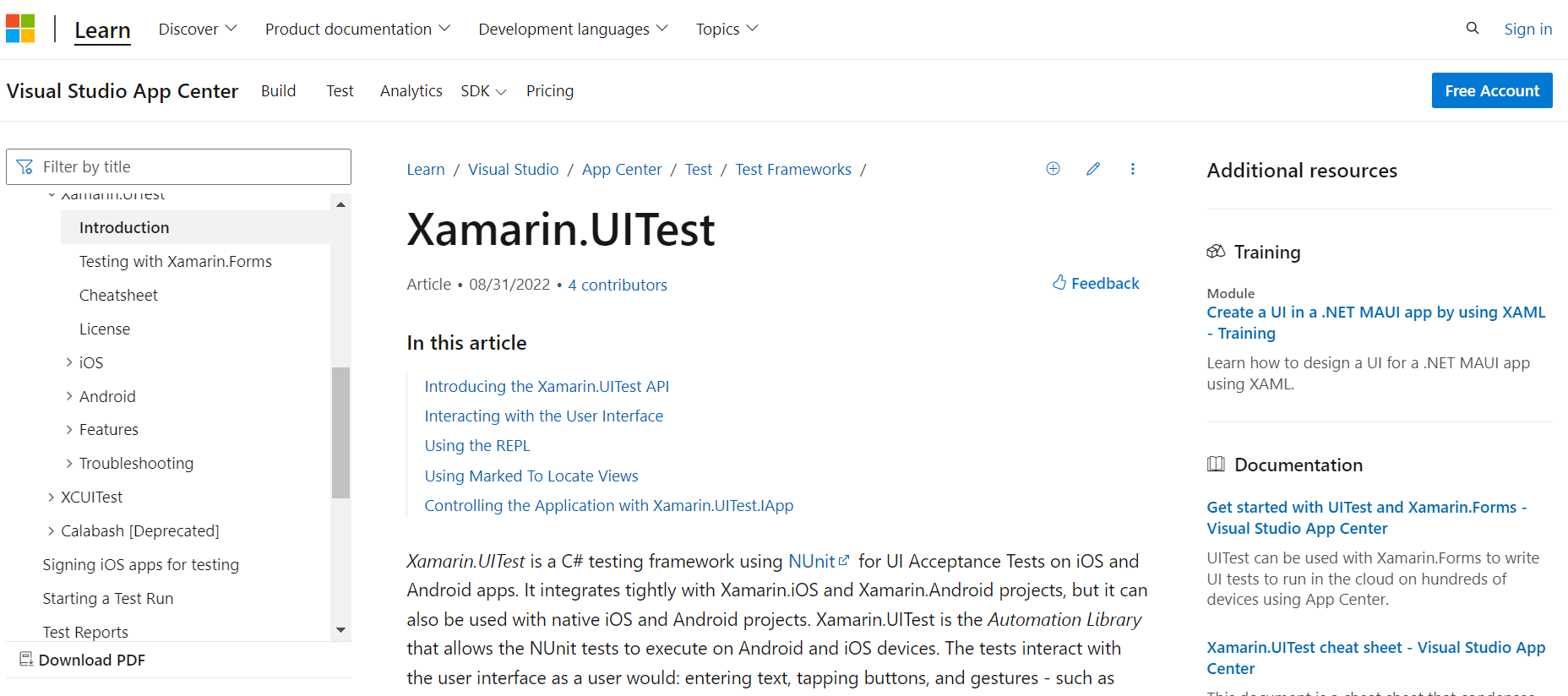
Xamarin.UITest is a C# testing framework that uses NUnit to perform UI Acceptance Tests on iOS and Android applications. This framework works smoothly with Xamarin.iOS and Xamarin. Android applications, as well as native iOS and Android projects. Developers may successfully automate the execution of NUnit tests on Android and iOS devices using Xamarin.UITest. These tests mimic user interactions with the app’s UI, including text input, button tapping, and even motions like swiping.
Pros of using Xamarin.UITest mobile app testing tool
- Xamarin.UITest enables cross-platform testing by leveraging similar app pages across platforms.
- The Page Object Pattern (POP) in Xamarin.UITest ensures scalable, maintainable, and readable tests.
- Its REPL tool allows real-time interaction and UI element exploration.
- Native Xamarin Test Cloud support empowers running tests on a vast array of devices in the cloud. These benefits and features make Xamarine.UITest one of the best mobile app testing tools.
Cons of using Xamarin.UITest mobile app testing tool
- Using Xamarin.UITest requires Xamarin.Forms, which may not be ideal for all developers or projects.
- The API in Xamarin.UITest is limited, restricting the evaluation of advanced UI properties.
- Xamarin.UITest has minimal distinctions between Android and iOS, which can be bothersome depending on your specific needs.
- Slow scrolling performance is a drawback of Xamarin.UITest.
- Reliability issues, including device port conflicts, may arise when using Xamarin.UITest.
10. iOS Driver
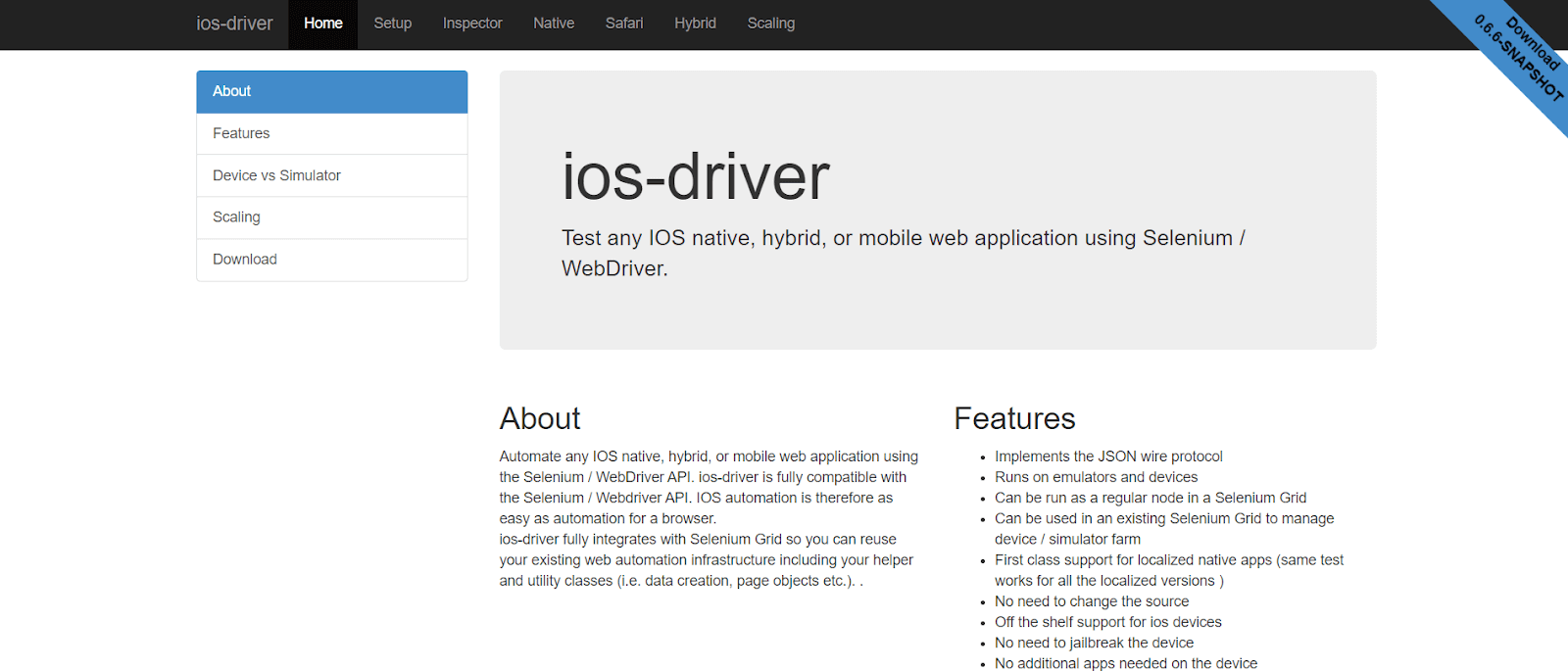
When comparing iOS Driver to actual devices, it demonstrates superior performance on emulators. Utilizing the Selenium/WebDriver API enables the seamless integration of iOS hybrid and native mobile applications with Selenium, facilitating effective testing procedures. It is important to note that the iOS Driver relies on two distinct frameworks developed by Apple. Therefore, verifying the system requirements before proceeding with the installation process is essential.
Pros of using iOS Driver mobile app testing tool
- It implements the JSON wire protocol, enabling efficient communication between client and server.
- It is compatible with emulators and devices, allowing for testing on various platforms.
- It can function as a standard node within a Selenium Grid, providing seamless integration with existing infrastructure.
- It seamlessly integrates with an existing Selenium Grid, enabling efficient management of device and simulator farms.
Cons of using iOS Driver mobile app testing tool
- Unlike other mobile app testing tools, the application’s performance is compromised on actual devices compared to the emulator.
- Undocumented APIs are utilized by the application, causing unexpected behavior.
- Writing tests in Objective-C poses a challenge for the QA team, who may be unfamiliar with the language.
11. UI Automator (Android)
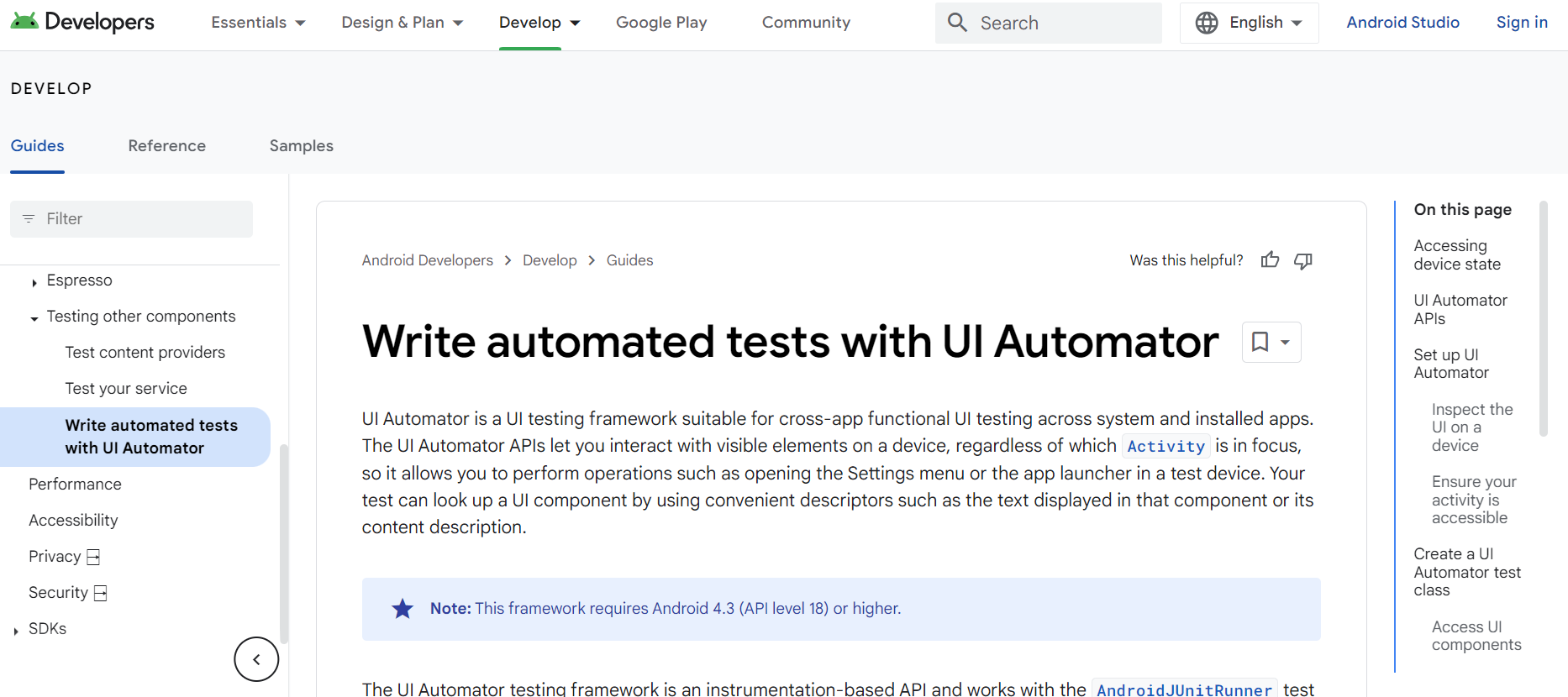
The UI Automator is an efficient UI testing tool for running cross-app functional UI tests across both systems and installed applications. The UI Automator APIs enable you to interact with visible items on a device regardless of the currently active Activity. This means you can access the Settings menu or the app launcher on a test device without interruption. You can easily discover and interact with certain items within your tests by using user-friendly descriptors such as the displayed text or content description of a UI component.
Pros of using UI Automator mobile app testing tool
- User-friendly setup and use: The system is designed to be easily set up and used by users with intuitive interfaces.
- Easy components interaction: Users can seamlessly interact with different system components, enhancing overall usability.
- Efficiently works with UI elements: The system efficiently handles UI elements, allowing smooth and direct interaction for users.
Cons of using UI Automator mobile app testing tool
- The framework exclusively supports Java and Kotlin for app development on Android.
- It mandates a minimum Android version of 4.3 or higher, along with SDK version 21 or above and API version 16 or higher.
12. MonkeyRunner
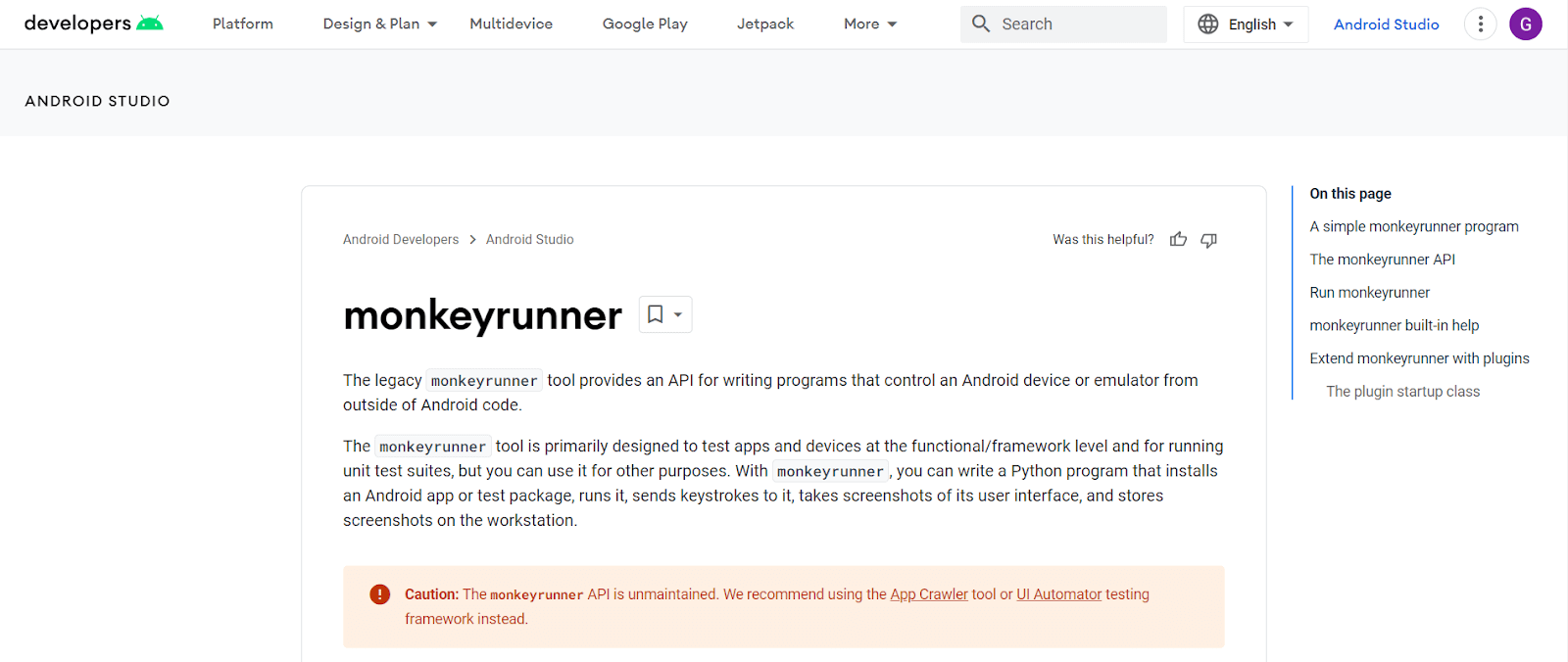
The legacy MonkeyRunner tool offers an application programming interface (API) that enables the development of programs to control an Android device or emulator from external sources rather than within the Android code itself.
The MonkeyRunner tool is primarily meant for app and device testing at the functional/framework level and running unit test suites, but it can also be used for other reasons. You can use MonkeyRunner to write Python programs that install Android apps or test packages, execute them, submit keystrokes, capture screenshots of the user interface, and save those screenshots to your computer.
Pros of using MonkeyRunner mobile app testing tool
- It enables testing of apps and devices by assessing their functionality and framework, including running unit test suites.
- It supports the application of multiple test suites on various devices or emulators.
- It allows installation, execution, keystroke input, screenshot capture, and storage functionalities.
- It facilitates regression testing by comparing screenshots with a predefined set of correct ones.
- It can be expanded with plugins and leverages Python modules to access Android tools.
Cons of using MonkeyRunner mobile app testing tool
- Writing scripts for each device and adapting them for UI changes is necessary to ensure seamless functionality across different devices.
- Performance issues and compatibility problems may arise when using older scripts on newer Android versions, demanding updates to maintain optimal performance.
You can also checkout this guide on mobile performance testing.
13. Frank

Frank is a comprehensive and one of the best mobile app testing tools meant to make developing and running tests for Mac and iOS native apps easier. Frank serves as a vital adaptor, building a connection between the app and Cucumber by using the capabilities of Cucumber, a well-known tool for behavior-driven development (BDD).
This integration enables testers to write tests in clear and straightforward English, ensuring a thorough evaluation of the app’s functionality and user experience. Frank allows testers to imitate user behaviors easily, thoroughly inspect UI elements, record images, and run tests on simulators or real devices.
Pros of using Frank mobile app testing tool
- Cucumber enables testers to write tests in plain English, promoting clear communication and collaboration.
- It is one of the best mobile app testing tools because It offers testing support for both Mac and iOS native apps, ensuring comprehensive coverage across platforms.
- The tool can simulate user actions, inspect UI elements, take screenshots, and execute tests on simulators or real devices, facilitating thorough testing and analysis.
Cons of using Frank mobile app testing tool
- The app’s source code needs to be modified for testing purposes.
- Unlike other popular mobile app testing tools, the recording feature for capturing user actions and generating test scripts is unavailable.
- The supported programming language is Ruby, and the framework used is Cucumber.
14. EarlGrey
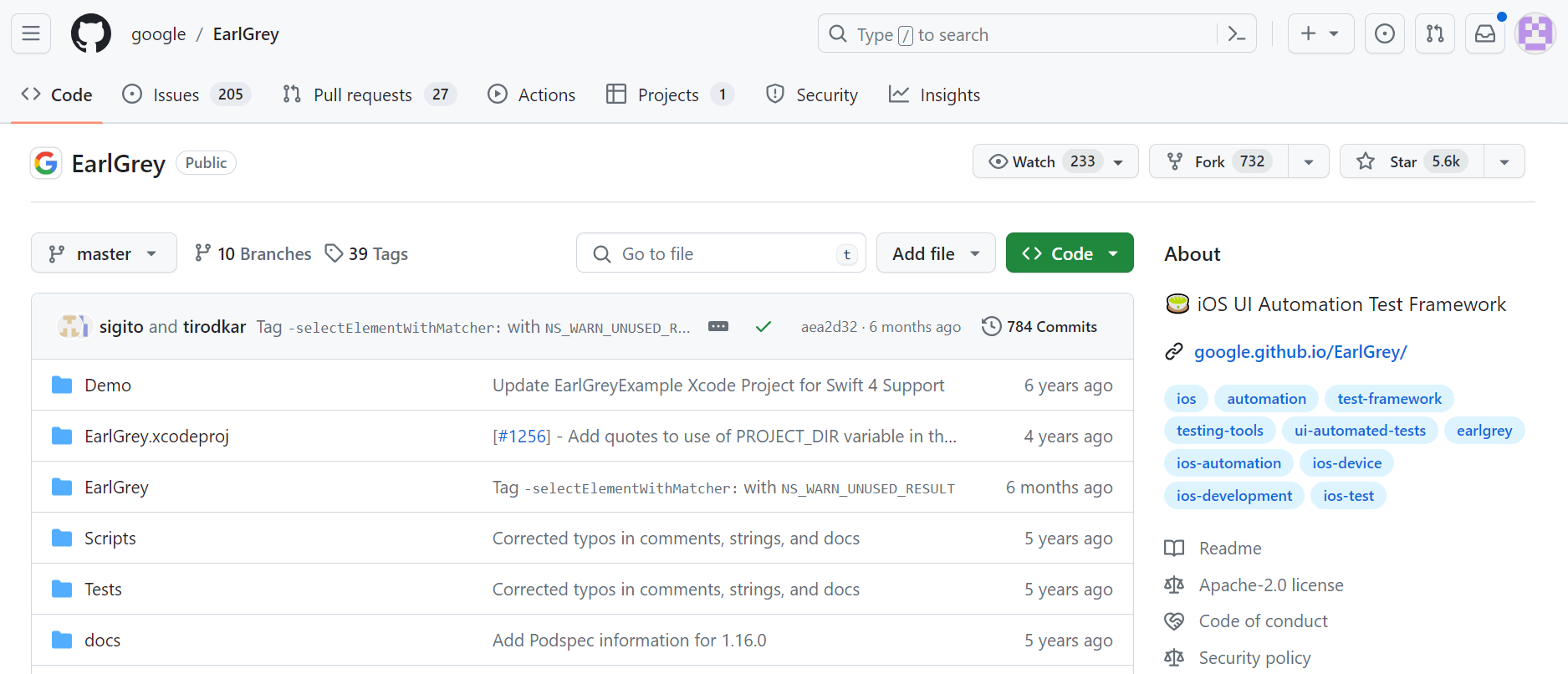
EarlGrey serves as a native iOS UI automation test framework that empowers you to create clear and concise tests. By utilizing the EarlGrey framework, you gain access to advanced synchronization functionalities. EarlGrey automatically synchronizes with the user interface, network requests, and various queues while still providing the option to implement custom timings, if necessary, manually.
The synchronization features offered by EarlGrey are instrumental in ensuring that the user interface remains stable before executing actions. This significantly enhances the stability of tests and renders them highly repeatable.
Pros of using EarlGrey mobile app testing tool
- EarlGrey simplifies test writing with the XCTest framework, making tests clear and concise.
- Enhanced synchronization in EarlGrey automatically handles UI, network requests, and queues, improving test reliability.
- EarlGrey supports testing for native and hybrid iOS apps, providing versatility in test coverage.
Cons of using EarlyGrey mobile app testing tool
- The app exclusively works on iOS devices, excluding Android and other platforms.
- Xcode is necessary for running tests; alternative IDEs are not supported.
- Possible compatibility problems may arise with certain third-party libraries or frameworks.
15. Calabash
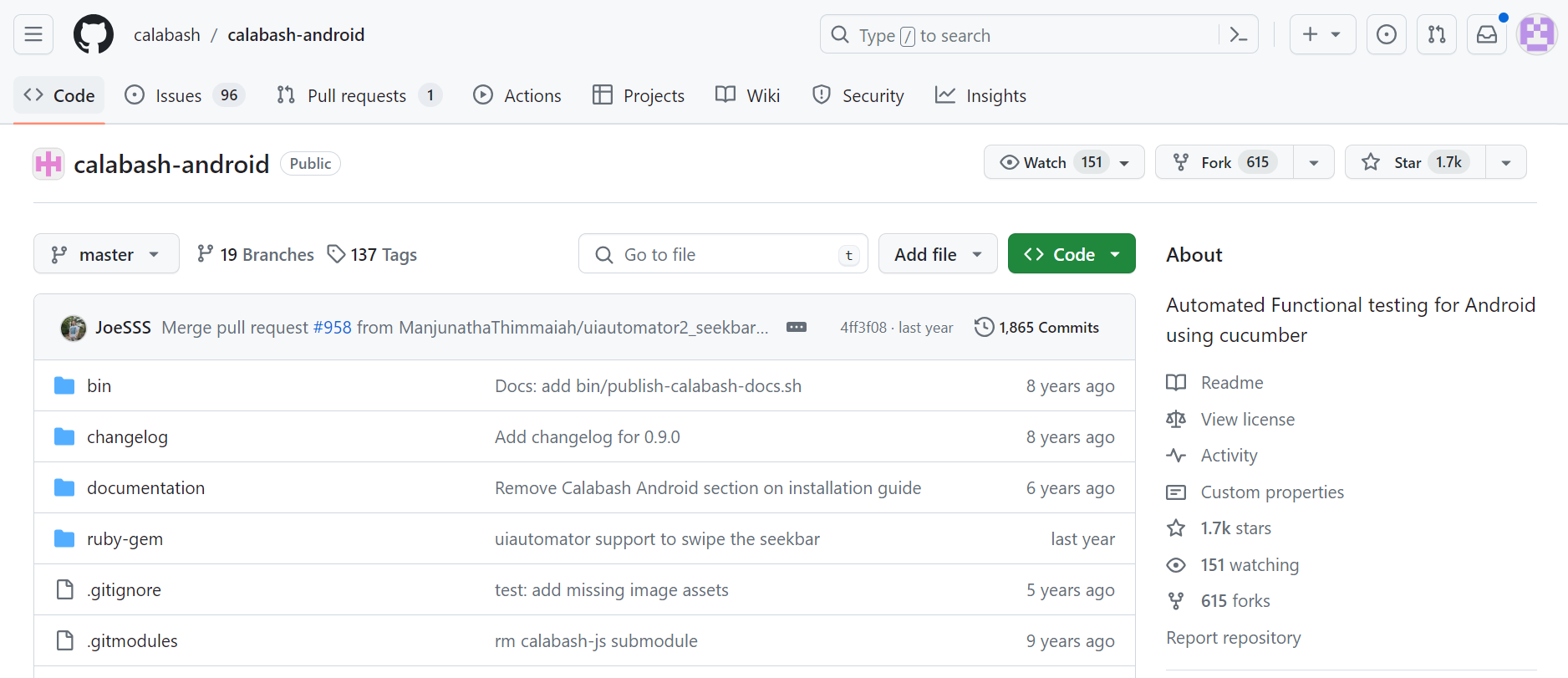
Calabash is an open-source acceptance testing framework that makes it easy to create and run tests for iOS and Android apps. This framework functions as an automated user interface framework, allowing developers to write Cucumber tests in Ruby. Its core premise is to enable automatic UI interactions within a mobile application, such as pushing buttons, entering text, and validating responses. Its adaptability enables configuration across Android and iOS devices, ensuring real-time feedback and thorough validations.
Pros of using Calabash mobile app testing tool
- Calabash offers a uniform interface for multiple platforms, simplifying development for Android and iOS with a single script file.
- Cucumber integration in Calabash allows QA, domain experts, and developers to write feature files using simple or domain-specific language, enhancing readability.
- Calabash supports running scripts on physical devices and simulators, enabling concurrent testing across various devices.
- The large Calabash community contributes to product quality, providing opportunities for developers to extend functionality and offer feedback.
Cons of using Calabash mobile app testing tool
- Proficiency is crucial for writing effective automation test scripts that deliver accurate results.
- Unlike other mobile app testing tools, debugging test scripts pose significant challenges, requiring careful analysis and troubleshooting.
- Playback methods in automation testing can be expensive to maintain due to the need for frequent updates and adjustments.
- Managing test data files becomes more complex when test scripts cover multiple screens, requiring meticulous maintenance efforts.
16. KIF
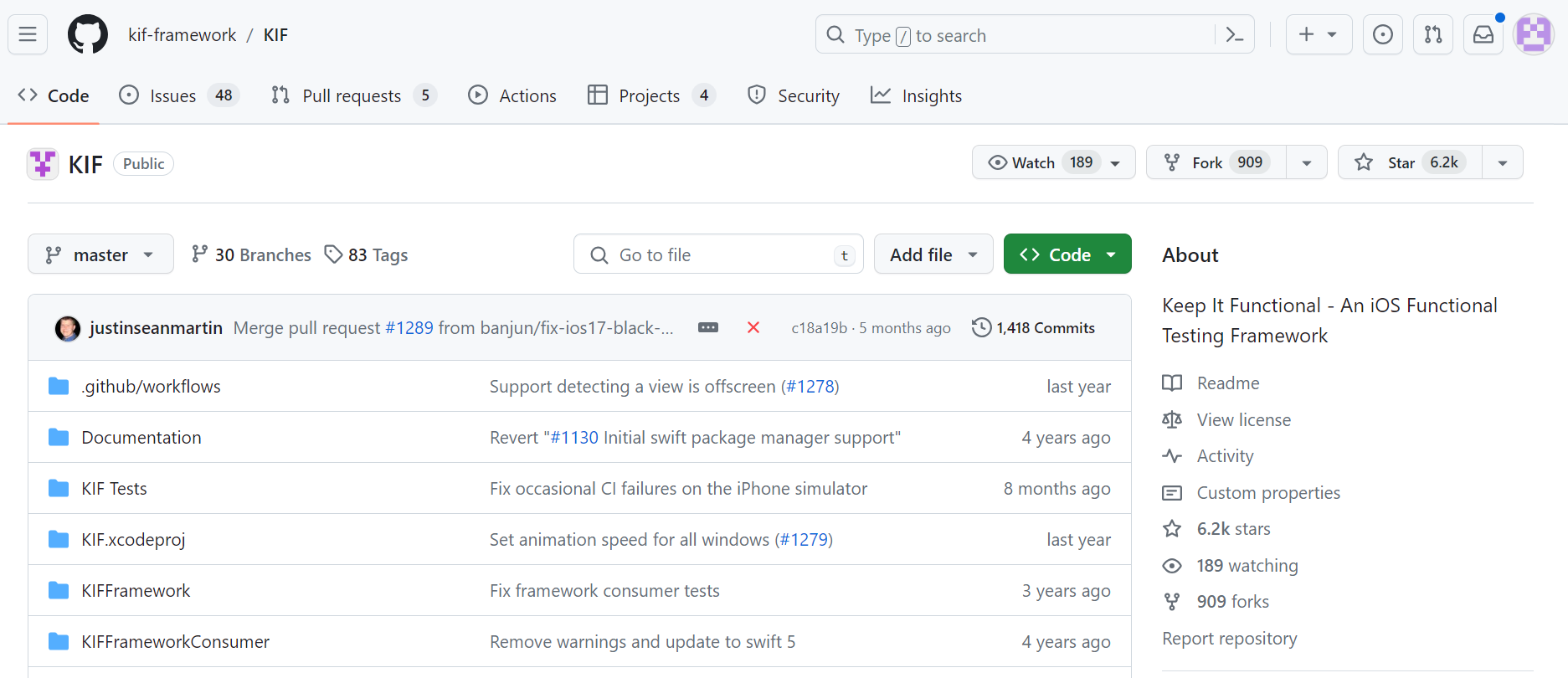
KIF, short for Keep It Functional, serves as an integration testing framework specifically designed for iOS. Its primary purpose is to facilitate the automation of iOS applications by utilizing the accessibility attributes provided by the operating system, primarily intended for individuals with visual impairments.
It is worth noting that KIF utilizes undocumented Apple APIs, a characteristic common among many iOS testing tools. While these APIs are deemed safe for testing purposes, ensuring that KIF is not incorporated into production code is crucial. Failure to comply with this guideline can result in Apple rejecting your app submission.
Pros of using KIF mobile app testing tool
- All tests for KIF are written in Objective-C, enabling seamless integration with your code and reducing the need for additional layers. This feature makes it different compared to other mobile app testing tools.
- KIF seamlessly integrates into your Xcode project, eliminating the need for a separate web server or additional package installations.
- KIF’s test suite is designed to work with iOS 8+ and Xcode 7+, and while lower versions may still function, results may vary.
- KIF strives to replicate real user input by utilizing tap events for automation whenever feasible.
Cons of using KIF mobile app testing tool
- Using undocumented Apple APIs may lead to incompatibility with future iOS or Xcode versions, risking functionality disruption.
- Writing tests in Objective-C can be undesirable for Swift or other language developers, impacting preference and productivity.
- Running tests synchronously in the main thread may introduce performance problems and disrupt the app’s functioning.
- The tool lacks support for testing push notifications, background modes, and other non-visible app states, limiting comprehensive testing capabilities.
17. Detox

One of the most challenging aspects of automated testing in the mobile realm pertains to the apex of the testing pyramid, namely end-to-end testing. E2E tests commonly face the issue of flakiness, where the tests’ outcomes are often non-deterministic. To confront this problem directly, a shift from black box testing to grey box testing becomes necessary. This is precisely where Detox proves its value. By employing Detox, you can conduct tests on your mobile application while it runs on an actual device or simulator, effectively interacting with it as a genuine user would.
Pros of using Detox mobile app testing tool
- Write JavaScript-based end-to-end tests that can run on both iOS and Android devices, making it easier to test your app across different platforms.
- With a modern async-await API, you can set breakpoints in your asynchronous tests, allowing for easier debugging and troubleshooting.
- By monitoring asynchronous operations within your app, Detox helps prevent flakiness in your tests, ensuring reliable results.
- Detox seamlessly integrates with popular CI platforms like Travis CI, Circle CI, or Jenkins, enabling you to run your end-to-end tests in a continuous integration environment hassle-free.
- Test your app on a device or simulator, simulating real user interactions, providing confidence before shipping (iOS support is not yet available).
Cons of using Detox mobile app testing tool
- Android support is steadily improving, addressing previous limitations.
- iOS lacks real testing capabilities, hindering comprehensive app assessment.
- Web views and hybrid apps lack support, limiting testing options.
- Key methods like extracting text or locating coordinates are missing, reducing functionality.
- Compared to other mobile app testing tools, Detox falls short in test reporting and screenshot capabilities.
18. TestFlight
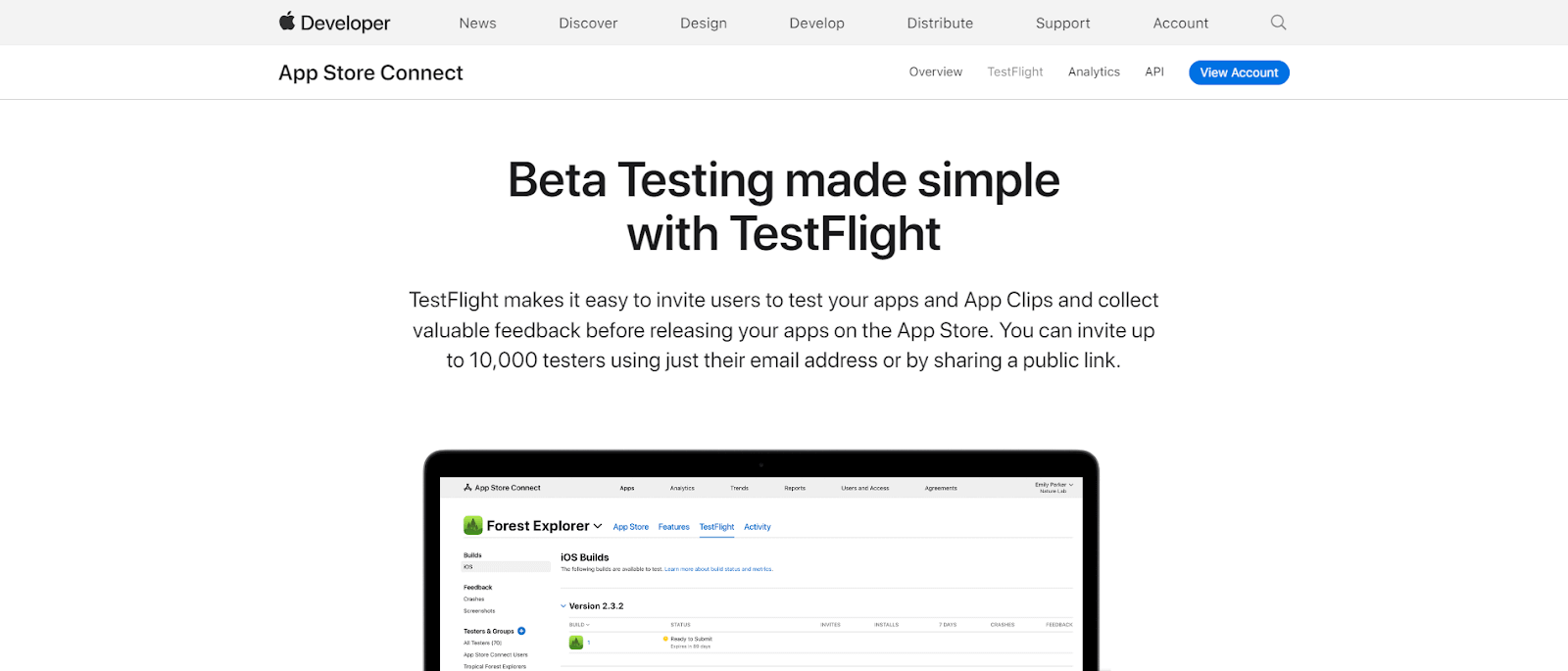
TestFlight offers a user-friendly solution for inviting individuals to test your apps and App Clips, enabling you to gather valuable feedback before launching them on the App Store. By leveraging TestFlight, you can easily upload a beta version of your app or App Clip to App Store Connect. Testers can then utilize the TestFlight app to install your application and share their feedback. TestFlight supports iOS, iPadOS, macOS, tvOS, watchOS, and iMessage apps while ensuring that testers consistently work with the most up-to-date build through automatic updates.
Pros of using TestFlight mobile app testing tool
- With our testing platform, you can simultaneously test up to 100 apps, both internally and externally, allowing for efficient evaluation.
- Designate up to 100 team members as beta testers, giving them various roles such as Account Holder, Admin, App Manager, Developer, or Marketing.
- Each team member can test beta builds on up to 30 devices, enabling rapid iteration and thorough evaluation.
- All beta builds are accessible to team members, facilitating comprehensive testing and feedback.
- Uploaded builds remain active for 90 days, ensuring an extended testing period for thorough analysis and improvements. Such features and benefits makesTestFlight one of the best mobile app testing tools.
Cons of using TestFlight mobile app testing tool
- Apple TestFlight excludes 25% of users still on iOS 7, limiting its availability to iOS 8+.
- Apps undergo a “beta review” process prior to being accessible to external testers.
- A build uploaded to iTunes Connect requires some processing time, typically several hours before it becomes accessible regardless of its external or internal status.
19. XCTest
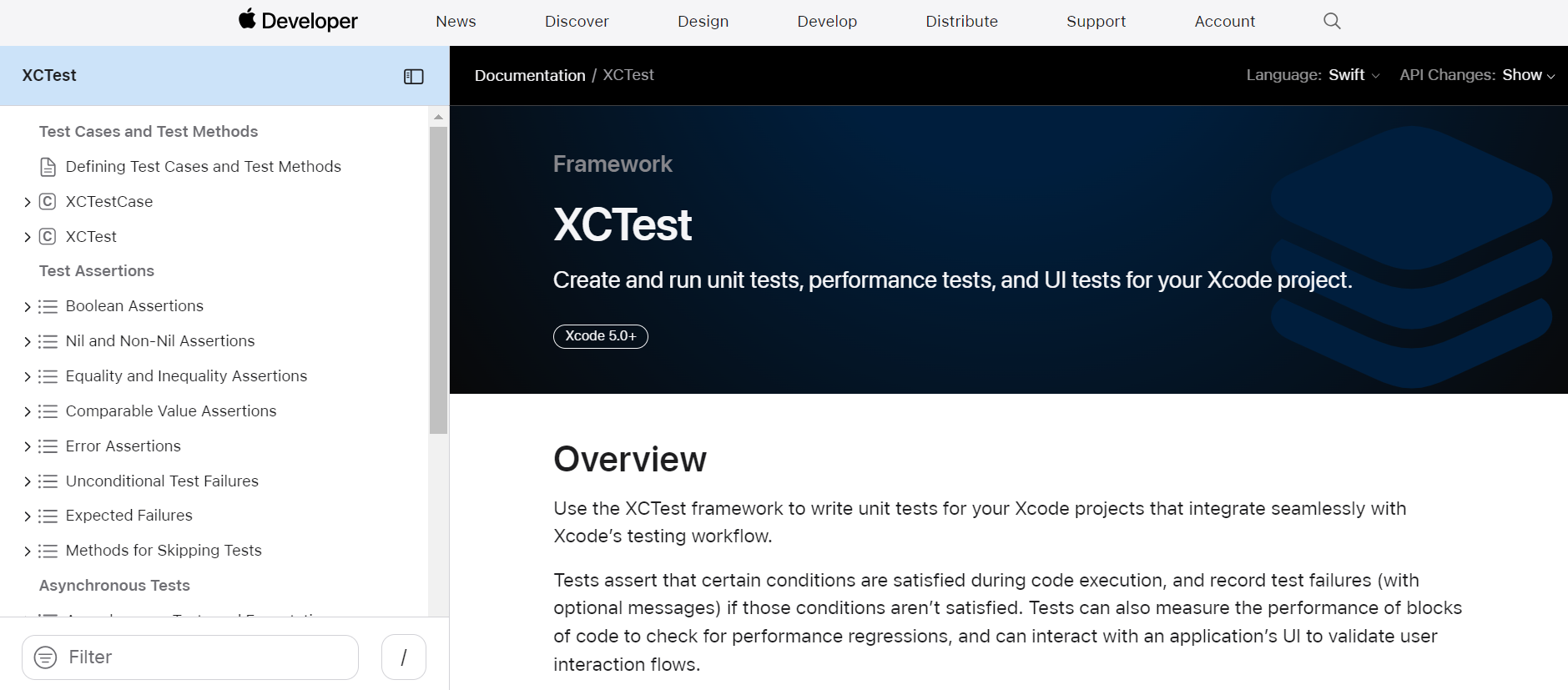
XCTest mobile app testing tool is used to create unit tests for your Xcode projects and integrate them into the testing workflow. It is one of the best mobile app testing tools for iOS devices.
These tests are designed to validate the fulfillment of specified criteria during code execution, and they document any test failures and optional messages when these requirements are not fulfilled. Furthermore, they allow for the performance assessment of code blocks to discover potential regressions, as well as interaction with an application’s user interface to check the smooth flow of user interactions.
Pros of using XCTest mobile app testing tool
- It is easy to learn, and no additional components are required.
- It has native iOS language support, making it seamless to develop applications for Apple devices.
- Xcode’s UI testing capabilities allow for recording and generating code to run tests exactly as intended during the UI test recording.
- Integrating XCTest with continuous integration is straightforward and hassle-free.
Cons of using XCTest mobile app testing tool
- XCTest lacks compatibility across multiple platforms, limiting its usage and reach.
- It has restrictions on the programming languages it supports, hindering developers’ flexibility and choice.
- Initial tests and simulations function well, but stability issues arise when executed on actual devices, highlighting the need for improvements with XCTest and Xcode.
20. ACCELQ
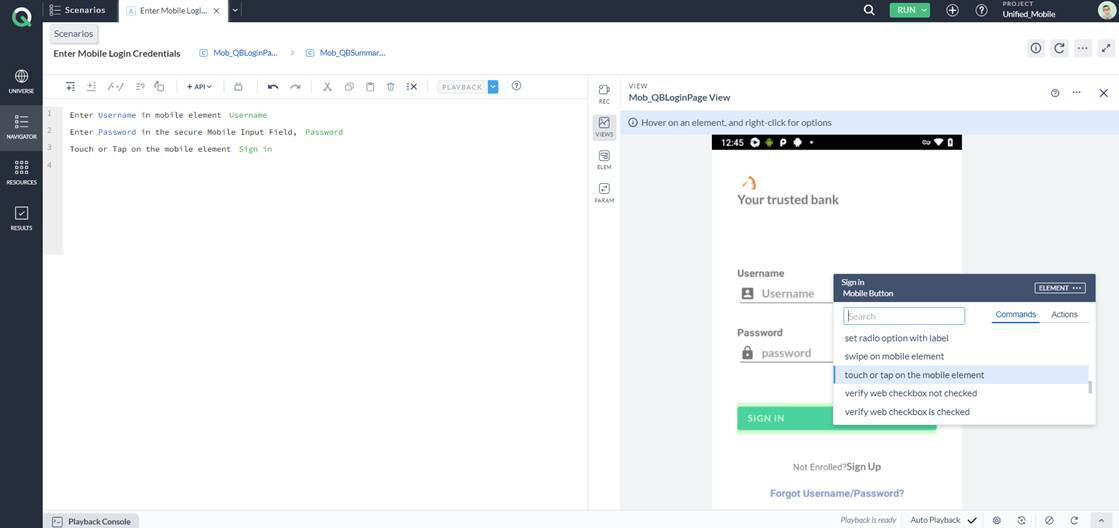
ACCELQ is a cloud-based continuous testing platform that can automate Web, API, and mobile testing in a unified flow without a single line of code. This is achieved through AI-powered technology using integrated device cloud labs for cross-device testing with error-fixing and self-healing abilities. Design and user experience are focused, while their continuous innovative capabilities help seamless mobile testing deliver quality outcomes.
Pros of ACCELQ mobile app testing tool
- This platform follows a functional approach while automating mobile devices. This approach enables the entire team to do the testing phase without specialists.
- It provides powerful and intelligent mobile element identification technology.
- It adopts a unified, OS-agnostic approach with a central object repository for iOS and Android.
- No coding is required, even if the mobile apps are complex and dynamic.
- This platform follows a design-first approach with inbuilt modularity and no need for custom frameworks.
- The version control, branching, and merging are all in a collaborative cloud platform.
- ACCELQ’s application universe and analytic-based algorithms drive automated test planning to ensure coverage.
- It is a smart test management platform to alert and analyze the impact of automated app changes.
- It executes across browsers and platforms on cloud or on-premises labs.
- Executed tests can be scheduled or triggered by CI workflow.
- ACCELQ integrates with popular tools such as Jenkins, TeamCity, and Bamboo to present a unified view of the quality lifecycle.
- Email notifications are sent to fit into the team’s process and enable quick decision-making.
Cons of ACCELQ mobile app testing tool
- While a 14-day free trial is available, ACCELQ is a commercial tool and not open-source.
What to Look for in Your Mobile App Testing Tool?
A good mobile application testing tool should let you set smart testing strategies and define clear goals before you perform the actual testing. Finding the right tool for script generation is the first step toward automation testing. Once the tool is chosen, you can start setting up the testing environments.
You need to pay attention to the features of the mobile application testing tools and ensure to pick a reliable solution that gives you different test creation options with multiple programming languages and platform support. Here are some mobile app testing checklists that your team should consider while choosing the right mobile app testing tool:
Supports multiple programming languages: Mobile apps can be developed in any programming language depending on cost, requirements, and target audience. However, it is always good to choose mobile app testing tools that allow the tester to write test cases in various programming languages.

Source
Summary
Throughout this blog, we looked at various mobile app testing tools that have received industry reputation and popularity. By utilizing these technologies, developers and testers can streamline their testing processes, reduce manual work, and improve overall testing efficiency. Compatibility, robustness, and great user experience are all ensured by the ability to test programs across several platforms, devices, and scenarios.
Finally, mobile app testing tools are critical assets that enable developers and testers to assure the quality, performance, and user happiness of their mobile applications. So, equip yourself with the best testing tools, embrace innovation, and design exceptional mobile experiences that last.
Frequently Asked Questions (FAQs)
What is mobile app testing?
Mobile application testing is the process of testing mobile apps for functionality, usability, and consistency. Mobile app testing on mobile devices can be performed manually or automatically.
How to test mobile app API?
There are numerous methods for testing APIs, including using tools such as Postman and curl command line tools, as well as an API testing framework such as SoapUI. The most common way for web and mobile API testing is to utilize an API testing tool such as JMeter, Apigee, or Karate.
What is the difference between mobile testing and application testing?
Mobile testing frequently includes checking the mobile device itself, whereas mobile application testing involves testing a program that will run on the selected device. When we refer to device testing, hardware testing is included.
Is mobile app testing easy?
Mobile app testing can be challenging due to the wide range of device types, operating systems, and screen sizes. However, with proper planning, tools, and strategies, it can be made more manageable and effective.
What are the 3 types of mobile applications?
Here is the list of types of mobile applications:
- Native Apps: Developed specifically for a particular mobile platform (e.g., iOS or Android) using platform-specific programming languages (Swift/Objective-C for iOS, Java/Kotlin for Android).
- Web Apps: Mobile-friendly websites accessed through a browser but designed to resemble and function like a native app.
- Hybrid Apps: Combines elements of both native and web apps, using web technologies (HTML, CSS, JavaScript) wrapped in a native container for access to device features.
Mehul Gadhiya
Mehul works as a content writer and executive in digital marketing for LambdaTest. He has a Mechanical Engineering degree and a keen interest in emerging technology. He enjoys writing about a variety of subjects, including the latest technological advances.
Mehul works as a content writer and executive in digital marketing for LambdaTest. He has a Mechanical Engineering degree and a keen interest in emerging technology. He enjoys writing about a variety of subjects, including the latest technological advances.
Got Questions? Drop them on LambdaTest Community. Visit now
Test Your Web Or Mobile Apps On 3000+ Browsers

Signup for free































